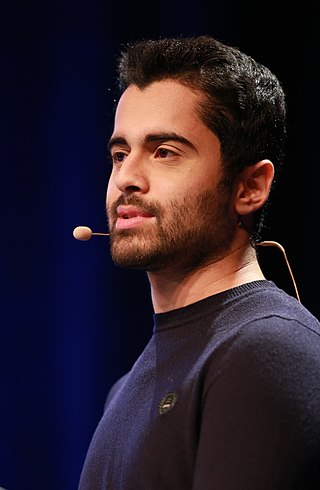
Crypto-anarchy, crypto-anarchism, cyberanarchy or cyberanarchism is a political ideology focusing on the protection of privacy, political freedom, and economic freedom, the adherents of which use cryptographic software for confidentiality and security while sending and receiving information over computer networks. In his 1988 "Crypto Anarchist Manifesto", Timothy C. May introduced the basic principles of crypto-anarchism, encrypted exchanges ensuring total anonymity, total freedom of speech, and total freedom to trade. In 1992, he read the text at the founding meeting of the cypherpunk movement. Most Crypto-anarchists are anarcho-capitalists but some are anarcho-mutualists.

David Lee Chaum is an American computer scientist, cryptographer, and inventor. He is known as a pioneer in cryptography and privacy-preserving technologies, and widely recognized as the inventor of digital cash. His 1982 dissertation "Computer Systems Established, Maintained, and Trusted by Mutually Suspicious Groups" is the first known proposal for a blockchain protocol. Complete with the code to implement the protocol, Chaum's dissertation proposed all but one element of the blockchain later detailed in the Bitcoin whitepaper. He has been referred to as "the father of online anonymity", and "the godfather of cryptocurrency".
Traffic analysis is the process of intercepting and examining messages in order to deduce information from patterns in communication. It can be performed even when the messages are encrypted. In general, the greater the number of messages observed, the greater information be inferred. Traffic analysis can be performed in the context of military intelligence, counter-intelligence, or pattern-of-life analysis, and is also a concern in computer security.
The Free Haven Project was formed in 1999 by a group of Massachusetts Institute of Technology students with the aim to develop a secure, decentralized system of data storage. The group's work led to a collaboration with the United States Naval Research Laboratory to develop Tor, funded by DARPA.
A Sybil attack is a type of attack on a computer network service in which an attacker subverts the service's reputation system by creating a large number of pseudonymous identities and uses them to gain a disproportionately large influence. It is named after the subject of the book Sybil, a case study of a woman diagnosed with dissociative identity disorder. The name was suggested in or before 2002 by Brian Zill at Microsoft Research. The term pseudospoofing had previously been coined by L. Detweiler on the Cypherpunks mailing list and used in the literature on peer-to-peer systems for the same class of attacks prior to 2002, but this term did not gain as much influence as "Sybil attack".

Tor is a free overlay network for enabling anonymous communication. Built on free and open-source software and more than seven thousand volunteer-operated relays worldwide, users can have their Internet traffic routed via a random path through the network.

Steven James Murdoch is Professor of Security Engineering in the Computer Science Department, University College London. His research covers privacy-enhancing technology, Internet censorship, and anonymous communication, in particular Tor. He is also known for discovering several vulnerabilities in the EMV bank chipcard payment system and for creating Tor Browser.

Digital privacy is often used in contexts that promote advocacy on behalf of individual and consumer privacy rights in e-services and is typically used in opposition to the business practices of many e-marketers, businesses, and companies to collect and use such information and data. Digital privacy, a crucial aspect of modern online interactions and services, can be defined under three sub-related categories: information privacy, communication privacy, and individual privacy.

The bitcoin protocol is the set of rules that govern the functioning of bitcoin. Its key components and principles are: a peer-to-peer decentralized network with no central oversight; the blockchain technology, a public ledger that records all bitcoin transactions; mining and proof of work, the process to create new bitcoins and verify transactions; and cryptographic security.
Zerocoin is a privacy protocol proposed in 2013 by Johns Hopkins University professor Matthew D. Green and his graduate students, Ian Miers and Christina Garman. It was designed as an extension to the Bitcoin protocol that would improve Bitcoin transactions' anonymity by having coin-mixing capabilities natively built into the protocol. Zerocoin is not currently compatible with Bitcoin.

Mustafa Al-Bassam is an Iraqi- British computer security researcher, hacker, and co-founder of Celestia Labs. Al-Bassam co-founded the hacker group LulzSec in 2011, which was responsible for several high profile breaches. He later went on to co-found Chainspace, a company implementing a smart contract platform, which was acquired by Facebook in 2019. In 2021, Al-Bassam graduated from University College London, completing a PhD in computer science with a thesis on Securely Scaling Blockchain Base Layers. In 2016, Forbes listed Al-Bassam as one of the 30 Under 30 entrepreneurs in technology.
The dark web is the World Wide Web content that exists on darknets that use the Internet but require specific software, configurations, or authorization to access. Through the dark web, private computer networks can communicate and conduct business anonymously without divulging identifying information, such as a user's location. The dark web forms a small part of the deep web, the part of the web not indexed by web search engines, although sometimes the term deep web is mistakenly used to refer specifically to the dark web.

Matthew Daniel Green is an American cryptographer and security technologist. Green is an Associate Professor of Computer Science at the Johns Hopkins Information Security Institute. He specializes in applied cryptography, privacy-enhanced information storage systems, anonymous cryptocurrencies, elliptic curve crypto-systems, and satellite television piracy. He is a member of the teams that developed the Zerocoin anonymous cryptocurrency and Zerocash. He has also been influential in the development of the Zcash system. He has been involved in the groups that exposed vulnerabilities in RSA BSAFE, Speedpass and E-ZPass. Green lives in Baltimore, MD with his wife, Melissa, 2 children and 2 miniature dachshunds.
Monero is a cryptocurrency which uses a blockchain with privacy-enhancing technologies to obfuscate transactions to achieve anonymity and fungibility. Observers cannot decipher addresses trading Monero, transaction amounts, address balances, or transaction histories.

Roger Dingledine is an American computer scientist known for having co-founded the Tor Project. A student of mathematics, computer science, and electrical engineering, Dingledine is also known by the pseudonym arma. As of December 2016, he continues in a leadership role with the Tor Project, as a project Leader, Director, and Research Director.

Firo, formerly known as Zcoin, is a cryptocurrency aimed at using cryptography to provide better privacy for its users compared to other cryptocurrencies such as Bitcoin.
A wireless onion router is a router that uses Tor to connect securely to a network. The onion router allows the user to connect to the internet anonymously creating an anonymous connection. Tor works using an overlaid network which is free throughout the world, this overlay network is created by using numerous relay points created using volunteer which helps the user hide personal information behind layers of encrypted data like layers of an onion. Routers are being created using Raspberry Pi adding a wireless module or using its own inbuilt wireless module in the later versions.
Nano is a cryptocurrency characterized by a directed acyclic graph data structure and distributed ledger, making it possible for Nano to work without intermediaries. To agree on what transactions to commit, it uses a voting system with weight based on the amount of currency an account holds.
Diem was a permissioned blockchain-based stablecoin payment system proposed by the American social media company Facebook. The plan also included a private currency implemented as a cryptocurrency.
The Nym mixnet is a free and open-source software designed to ensure a high level of privacy in all online communications. It is an implementation of a mix network devised by David Chaum in 1981.










